- Home
- Nancy Pickard
The Secret Ingredient Murders: A Eugenia Potter Mystery Page 2
The Secret Ingredient Murders: A Eugenia Potter Mystery Read online
Page 2
That earned him a knowing smirk.
“You’re drunk again, Eddie. That’s why I fired you, man! When are you going to learn to take advantage of an opportunity when life presents it to you?” Stanley toughened his heart and the tone of his voice. “Go away, and don’t pull any stupid tricks on me! I fired you, and you’re still fired!”
He tried to make the little engine spit, but it was a puny sound. He turned the throttle, lifted his feet back onto the pedals, and rumbled straight toward the man in his path.
Hennessey jumped out of his way, raising a fist as he passed.
“I ain’t leaving here, old man! You’ll pay!”
Stanley drove on, determined not to show by even so much as the set of his shoulders how intimidated he felt, how uncharacteristically frightened. Now his hip hurt for real, and his chest felt squeezed.
What have I done? he accused himself.
He tried to shake off the nasty encounter with his hired man.
“No good will ever come of you, Ed Hennessey.”
But some good might come of tonight. He was still alive, by God. For a little while he was even out of pain. Or had been until that encounter. Pain or no he knew secrets that ought to be told, and soon, so no one else need suffer from them.
“It is a perfect night to bring justice to the table,” he told himself.
If he ever got the chance to meet Lillian in heaven—he should be so lucky—he wanted to see pride and welcome on her face. He wanted to hear her say, “Stanley, dear, you redeemed yourself there at the end, didn’t you?”
A few yards deeper down the path, he thought he heard his own name called. So lost was he in memories of Lillian that for a heart-lifting moment he thought it was her. He stopped the motorbike again, straddled it, and turned around to see who it was who hailed him on this darkest stretch of path above the sea.
2
GUEST LIST
“Honey?”
From the bathroom where she was putting on her makeup, Lindsay Wright heard her husband call out to her from their bedroom. The endearment he had used sounded as soft and lush as what it labeled, and she closed her eyes for a moment, pleasurably feeling its sweet warmth flow over her.
“Why don’t you call Mr. Parker,” her husband called in to her, “and see if he needs a ride to Mrs. Potter’s?”
Lindsay’s finger stopped dead in the middle of the mauve track it was laying down on her eyelid. Her pleasure in his voice and his affection for her felt as if it had ended in a sting. Fearful of smearing her eye shadow, because suddenly her fingers were trembling, she withdrew her hand and picked up a tissue. After wiping her finger clean with it, she grasped the edge of the sink with both hands to steady her voice before she answered him.
“He’s so close, he could practically walk there, Harrison!”
She hoped that would end it, but her husband’s resonant television weatherman’s voice came floating back to her as calmly as if he were predicting sunny skies. “But he’s ancient! And it’s going to rain. Wouldn’t it be a nice thing for us to do?”
Lindsay tried not to frown, not wanting to crease the foundation and powder on her forehead. Bitterly, and not loud enough for him to hear, she muttered, “Why would I want to do something nice for Stanley Parker?” She abandoned her makeup and walked to the doorway that separated the two rooms. Her blond hair and almost all of her makeup were perfectly in place, but she didn’t have a stitch on yet. Not that her husband would notice, she thought with fond exasperation.
Harrison stood at their bedroom window scanning the skies for his beloved stratus and altostratus and nimbostratus. She’d have to be a tornado to get his attention. Sometimes she joked to her friends that she was in serious danger of having her future children named after cloud formations: “Have you met the twins, Cirrus and Cirrostratus? And this is their older sister, Drizzle.”
Even in her present state of tension, she couldn’t help but admire her own good taste in husbands as she viewed him from the rear: his short cropped hair, his skin as dark as the thunderclouds he loved, his admirable posture, his nice plain suit. She would have loved to get him into something more fashionable, with more color, but he maintained that in conservative old Devon, Rhode Island, his complexion was all the color he dared wear if he wanted to remain a popular local celebrity. He wasn’t handsome, even she had to admit that, but there was something so attractive about Harrison that most people were drawn to him instantly, and when they were they were almost always smiling. It made her jealous sometimes, and other times she basked in his glow, sharing it.
“What’s this bug you’ve got about Stanley Parker?” she asked him, trying to keep any hint of agitation out of her voice. Not that he would notice, not when he was absorbed in the weather as he was at this moment. She could have said, “If you only knew, Stanley’s our worst enemy, the one person who can keep us from all we want, and I hate him and I wish he were dead.” And maybe Harrison would hear her, and most likely he would not, not if any clouds were moving. For once, Lindsay thanked God for giving her an obsessive, preoccupied spouse.
When Harrison still didn’t reply, Lindsay felt satisfied that she had managed to hide her true feelings.
What her husband said, instead, and without turning around, was, “ ‘Odysseus gathered the clouds and troubled the waters of the deep. He roused all storms of all manner of winds, and shrouded in clouds the land and sea.’ ”
She relaxed slightly. “Okay, I’ll bite. Who said that?”
“Homer. I may get to use the other h-word tonight, Lindy.”
“Hurricane? You’re kidding. Is it safe to go out?”
“Oh, I don’t mean tonight, I mean it’s building out east and south of us, just a tropical storm right now, but we could see something major by the end of the week.”
“What’s it called?”
“Phoebe. Tropical storm Phoebe. But she could grow.”
“Is that what the National Weather Service says?” Lindsay walked naked to their bed and began to dress in the designer suit she had laid out for herself. Silk, all silk, and not a thread of underwear underneath. Eventually, later, when they were home again and after his last weather forecast from the station, he would notice her. A sharp pang of sexual anticipation pierced her. And then Harrison would turn upon her the same intense attention to detail he paid to high pressure fronts and wind chill indexes. Lindsay shared him with a strange mistress, but at least it was one he couldn’t sleep with.
“Yeah, but that’s not why I’m saying it.”
Enviously, Lindsay watched him smile fondly at the clouds. If she were the weather channel, he’d never take his eyes off her.
“It’s what my senses tell me,” he continued. “Oh, look, there’s a halo around the moon tonight. We might have rain before we leave Mrs. Potter’s house.”
“How scientific,” she teased him, while with nervous fingers she fastened her last button. She heard how brittle and high her voice sounded, and tried to soften and lower it. “A halo.”
“I have it on the best authority.”
“Who’s that?”
“Theophrastus.”
“And who’s he when he’s at home?”
“A student of Aristotle’s.”
“I knew that,” she managed to joke.
He finally turned toward her, smiling. “It is scientific, Lindsay. Sunlight bends when it passes through the ice crystals that are suspended in the upper troposphere, and the crystals act like little prisms that break the light into the colors of the rainbow. Cirrus clouds are made of ice crystals, did you know that? Isn’t that wonderful? Theophrastus notwithstanding, a halo around the sun or moon usually indicates a change in the weather, if not always rain.”
“You know so much, Harrison.”
“About weather?” He habitually scoffed at his own encyclopedic knowledge of his subject. “That only makes me a savant, it doesn’t make me a wise man.”
“Harrison!” She always objected stoutly to
his self-deprecation. It was a duet they played, often reversing their roles. “And what do I know, except clothes and makeup?”
“And art. You know so much about art, Lindsay.”
“Yeah, but that’s just like a weather anomaly.”
Harrison laughed, looking puzzled. “What?”
“It’s just this unexpected talent I have, you know? Who’d have ever thought that dumb ol’ Lindsay Wright could tell a Matisse from a Monet? It’s not even a talent, really. What artists have is talent. What I have is like perfect pitch, only without being able to sing.”
“You think you’re just a pretty face.”
“And even that won’t last.”
“You’re funny, you’re sexy, you’re a wonderful wife, and you’re a lot smarter than you think you are. Do you think I married you only for your looks, Lindsay? What would that say about me? That would make me as shallow as … as …”
“A thin layer of cirrus clouds.”
Harrison laughed appreciatively. “Exactly. Thank you.”
Lindsay felt warmed and embraced by his laughter and the compliments. “A wonderful wife,” he’d said, and the words made her tingle. She tried so hard to be just that; Harrison didn’t have any idea how she worked at it sometimes, and she didn’t want him to know. Lindsay thought she’d do almost anything to keep him from knowing, because if he knew, he might not think she was so wonderful anymore.
“Harrison, you can’t be using the h-word lightly on the East Coast,” she teased him, changing the subject to something safer. “It’s like screaming wolf when there isn’t one. Or screaming tornado, I guess, for you folks from Iowa. Did you know that Mrs. Potter’s from Iowa, too, originally?”
She heard herself babbling, and made herself stop.
“So how do I look?” she asked, pirouetting beside their bed.
“Gorgeous. I still think we ought to call Mr. Parker.”
Lindsay sat down abruptly on the bed and stared at him.
“Why? Did Stanley say something to you?”
“Me? I hardly know him. You’re the one who says I ought to cultivate the important people in town.” It might have sounded cynical, even harsh, except for the clear, trusting expression in his eyes. Sometimes Lindsay wondered if her very smart husband wasn’t also a bit naive; if he didn’t trust people—even her—too much for his own good. He wasn’t like her; he’d come from middle-class privilege, not from the wrong side of the tracks in a town so small there was only one bus a day to Providence and then another one that returned at night. “I just think it would be a courteous thing to do.”
“Stanley wouldn’t know polite if you whacked him in the head with it.”
Harrison looked startled. “Has he ever been rude to you?”
Lindsay got up again, walked toward him, and pressed her body against him, hoping he wouldn’t feel the trembling she felt inside. When he wrapped his arms around her, she tilted her face up to look at him. “Yes, he’s been just a beast to me.” Teasingly, trying to keep it light so that her husband wouldn’t suspect anything was wrong, she added, “What are you going to do about it, Harrison?”
“Well, obviously, I’ll have to kill him. No man can be rude to my wife and live.”
It was exactly the right thing to say, and she kissed him for it.
David Graham paused while dressing for dinner to gaze at his late wife’s portrait. Lillian. Painted only one year before her death, it captured her natural elegance, which had only been enhanced by letting her dyed blond hair go fully white after they married. He had encouraged her to do that, and in fact, to do anything that made her feel completely herself. For Stanley Parker, she’d been the perfect bank president’s wife, groomed, dyed, lifted, preserved in wine and sherry. But all that David had ever asked her to be was herself, and in the short time they’d been together, Lillian had relaxed into that most contented of roles.
David smiled wistfully at her portrait.
“I hope I made you happy, Lil.”
He held one black sock in his left hand; his right foot was bare.
“You’ve made my life so easy, it doesn’t seem fair.”
She’d been wealthy—partly from birth, partly due to her divorce from Stanley—and when he met her he had been looking toward his “golden years” with worried eyes. Now she was gone, which meant she’d left him wealthy, but without her to spend it on. He’d loved giving her gifts, first with his own money, which he couldn’t afford to spend, but which he’d lavished on her anyway. And then—with her blessing—with her money. She had loved his taste, and he loved giving things to a woman who appreciated them. Lillian had thrived on romance, and so did he. He loved everything about it—the wooing, the courting—and the more passionate the better. Bless her, she had lapped it up like a starved dog who’d been kept by a mean master.
“Stanley meant well,” Lillian had said in faint praise of her ex. “But you do well, David.”
“My dear,” he had responded with a bow, which had made her smile. “A man always enjoys being favorably compared to his wife’s first husband.”
She’d laughed at that. He missed her sense of humor.
In two years of marriage—and the two months of courtship prior—they had laughed so much, traveled constantly, made love more often and more imaginatively than Lillian at first thought seemly for a couple their age. But she had savored every moment of it.
To her portrait, he said, “I’m glad you can’t see what’s happening to Stanley, Lil.”
No matter how archly she may have spoken of him, Lillian had kept a soft spot in her heart for her first husband, and David had understood that, without resenting it very much. “I’m too old to be jealous of ex-husbands,” he had joked, to reassure her. Lillian and Stanley had parented a child together, after all. They’d slept nearly a half century in the same bed. It was only to be expected that they continued to look out for one another. David suspected Stanley had always loved Lil more than she’d known, but the poor fool just never knew how to express that to her satisfaction.
Stanley was acting more and more like a fool these days, and Lillian wouldn’t have liked it if she’d seen it.
“Lil would hate to see it,” David had confided to one or two of his friends at the yacht club as recently as that afternoon. “Have you noticed? Any idea what’s going on with him? Do you know if he’s ill? I don’t know what’s come over him, but he’s been doing odd things, like getting me invited to dinner at Genia Potter’s this evening. You know her? The woman from Arizona, who’s renting that house up near Stanley’s? I know Stanley’s behind it. It has to be him, because I barely know the woman to say hello on the street. Don’t you think it’s odd as hell that Stanley Parker would invite me—of all people—to a dinner where he’s acting as host?”
When his friends asked him why he was going if he felt that way, David had laughed and said, “To see what the old bastard’s up to, of course!” And then, more seriously, he’d added, “And because I think Lil would want me to make sure he’s all right.”
They told him he was a good man, a compliment he shrugged off.
Now he asked her portrait, “What do you think he’s up to, Lil? Do you think I ought to try to have another word with him before the party?”
He imagined how she would shake her head at the very idea of her two husbands getting together for a little man-to-man chat. Devon was a small town, and he and Stanley were grown-ups, so they had never tried to avoid one another, but even Rhode Island wasn’t so small they had to seek each other out for lack of other company. At least David hadn’t had to do that, because he had had Lillian.
Now he kept a brave face on, partly to keep the town’s single women at bay. Maybe that’s why Stanley had maneuvered this invitation for him, his friends at the club had suggested, with grins and raised eyebrows: to matchmake between him and the Widow Potter. If David were to marry again, he wouldn’t any longer be known primarily as “Lillian’s widower,” but as somebody else’s husba
nd, and Stanley wouldn’t have to hear again that title that grated on his ego. Well, Eugenia Potter was an attractive woman, all right—sixtyish, nice face—but if David ever wed again, it would be he, not Stanley Parker, who chose the time, the place, the woman.
“And I’ll ask you first,” he promised his late wife.
He raised his right foot and balanced on his left while he drew on his other silk sock. A mailed invitation meant dress for dinner. A pale yellow summer dinner jacket lay on the king-size bed, as did white linen trousers, a crisp white shirt, and a pastel print tie. It looked more Palm Beach than Devon, but David knew that he did, too. All he lacked at the moment was a Florida tan to accompany the clothes. And white shoes, of course. In the mirror on his closet door, he caught an amusing glimpse of himself: half-dressed, one foot aloft, bent over like a stork, a slim, silver-haired man of medium height putting on a sock.
When he had both feet on the floor again, he blew a kiss to the portrait. The telephone began to ring, and David debated whether or not to answer it. He was afraid it would be Celeste Hutchinson asking for a ride to the dinner party. He didn’t want to escort her, in effect showing up with her as his date, but he also didn’t want to hurt her feelings.
“What should I do?” he implored Lillian.
She gazed down at him serenely, as if she believed him capable of tactfully spurning any adoring woman who came his way.
“You flatter me, Lil,” he told her. “I don’t deserve it.”
David Graham walked over slowly in his stocking feet to answer the phone, hoping the caller would give up. He finally picked it up after the fifth ring.
With shaking fingers Celeste Hutchinson had put down her highball and dialed David Graham’s telephone number. I’m a fifty-seven-year-old woman falling apart over a sixty-year-old man, and I will never, never let anyone know it! She had to wait through five rings before he picked up. Forcing her own tone to sound bright and carefree, she trilled, “David! What were you doing that it took you so long to answer? Taking a shower? You’d better hurry if you want to make it on time to Genia’s! I’m so glad I caught you before you left home!” My God, can I sound like a bigger fool than this? She heard the multitude of exclamation points in her little speech, and made herself calm down.

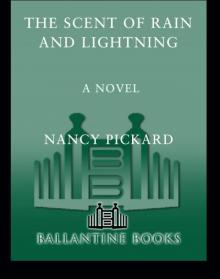 The Scent of Rain and Lightning
The Scent of Rain and Lightning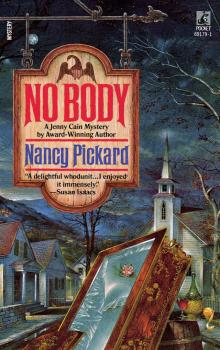 No Body
No Body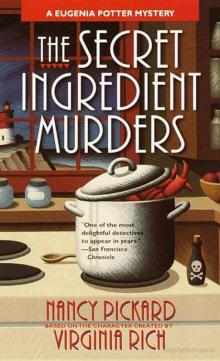 The Secret Ingredient Murders: A Eugenia Potter Mystery
The Secret Ingredient Murders: A Eugenia Potter Mystery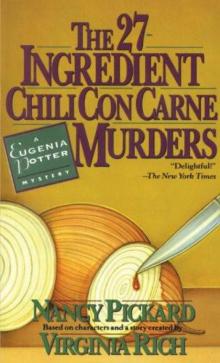 The 27-Ingredient Chili Con Carne Murders: A Eugenia Potter Mystery
The 27-Ingredient Chili Con Carne Murders: A Eugenia Potter Mystery Twilight
Twilight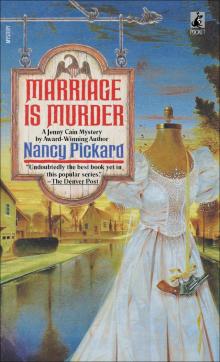 Marriage Is Murder
Marriage Is Murder I.O.U
I.O.U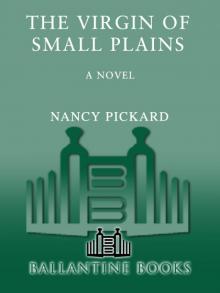 The Virgin of Small Plains
The Virgin of Small Plains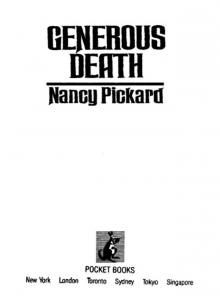 Generous Death
Generous Death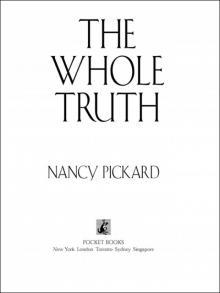 The Whole Truth
The Whole Truth The Blue Corn Murders
The Blue Corn Murders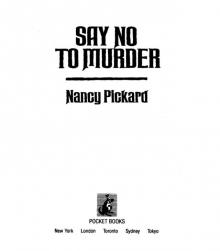 Say No to Murder
Say No to Murder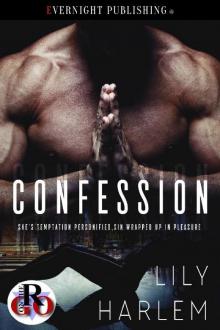 Confession
Confession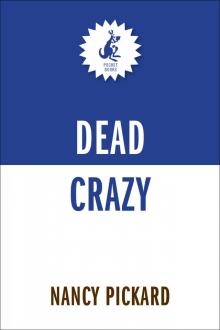 Dead Crazy
Dead Crazy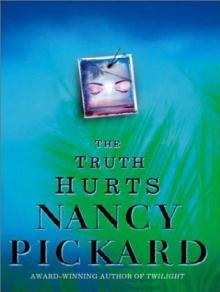 The Truth Hurts
The Truth Hurts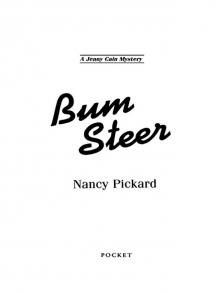 Bum Steer
Bum Steer